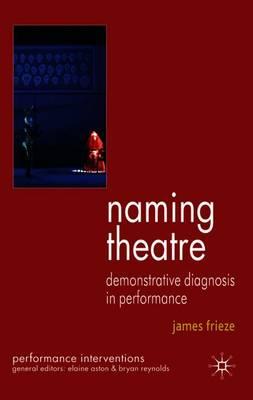Full Product Details
Author: J. Frieze
Publisher: Palgrave Macmillan
Imprint: Palgrave Macmillan
Dimensions:
Width: 14.00cm
, Height: 1.70cm
, Length: 21.60cm
Weight: 0.410kg
ISBN: 9780230517707
ISBN 10: 0230517706
Pages: 215
Publication Date: 16 October 2009
Audience:
Professional and scholarly
,
Professional & Vocational
Format: Hardback
Publisher's Status: Active
Availability: Out of stock

The supplier is temporarily out of stock of this item. It will be ordered for you on backorder and shipped when it becomes available.
Reviews
'Naming Theatre offers readers a comprehensive understanding of how names populate theatre and how they structure knowledge about a play. This book is an important contribution to the field...[and] prompts theatre scholars to expand the discourse related to their work (something which is frequently ignored) by establishing ways of questioning it.' - Stella Keramida, Platform ''Naming' is James Frieze's key term in a critique of identity and identification, which he sees as both a theme and a technique in contemporary theatre and performance... The book's strength and its substance is the exegesis of text and performance, through an ingenious variety of examples of naming as a process which embeds the subject in language, or alternatives strategies which manipulate naming to satirize or escape from such an inscription. It is the level of detail and the application of a mutating but consistent insight that is impressive here, and the book will be as useful as a collection of performance analyis as for its overall thesis.' - Gareth White, NTQ
'Naming Theatre offers readers a comprehensive understanding of how names populate theatre and how they structure knowledge about a play. This book is an important contribution to the field...[and] prompts theatre scholars to expand the discourse related to their work (something which is frequently ignored) by establishing ways of questioning it.' - Stella Keramida, Platform ''Naming' is James Frieze's key term in a critique of identity and identification, which he sees as both a theme and a technique in contemporary theatre and performance... The book's strength and its substance is the exegesis of text and performance, through an ingenious variety of examples of naming as a process which embeds the subject in language, or alternatives strategies which manipulate naming to satirize or escape from such an inscription. It is the level of detail and the application of a mutating but consistent insight that is impressive here, and the book will be as useful as a collection of performance analyis as for its overall thesis.' - Gareth White, NTQ
'Naming Theatre offers readers a comprehensive understanding of how names populate theatre and how they structure knowledge about a play. This book is an important contribution to the field...[and] prompts theatre scholars to expand the discourse related to their work (something which is frequently ignored) by establishing ways of questioning it.' - Stella Keramida, Platform Naming' is James Frieze's key term in a critique of identity and identification, which he sees as both a theme and a technique in contemporary theatre and performance... The book's strength and its substance is the exegesis of text and performance, through an ingenious variety of examples of naming as a process which embeds the subject in language, or alternatives strategies which manipulate naming to satirize or escape from such an inscription. It is the level of detail and the application of a mutating but consistent insight that is impressive here, and the book will be as useful as a collection of performance analyis as for its overall thesis.' - Gareth White, NTQ
'Naming Theatre offers readers a comprehensive understanding of how names populate theatre and how they structure knowledge about a play. This book is an important contribution to the field...[and] prompts theatre scholars to expand the discourse related to their work (something which is frequently ignored) by establishing ways of questioning it.' - Stella Keramida, Platform ''Naming' is James Frieze's key term in a critique of identity and identification, which he sees as both a theme and a technique in contemporary theatre and performance... The book's strength and its substance is the exegesis of text and performance, through an ingenious variety of examples of naming as a process which embeds the subject in language, or alternatives strategies which manipulate naming to satirize or escape from such an inscription. It is the level of detail and the application of a mutating but consistent insight that is impressive here, and the book will be as useful as a collection of performance analyis as for its overall thesis.' - Gareth White, NTQ
Author Information
JAMES FRIEZE is Senior Lecturer in Drama at Liverpool John Moores University, UK. He devises and directs new works for the stage and site-specific adaptations of novels, magazines, and virtual worlds. He has contributed to various journals, and is currently writing books on Ping Chong, and (with Anita Gonzalez) on diasporic performance in Liverpool and New York.



